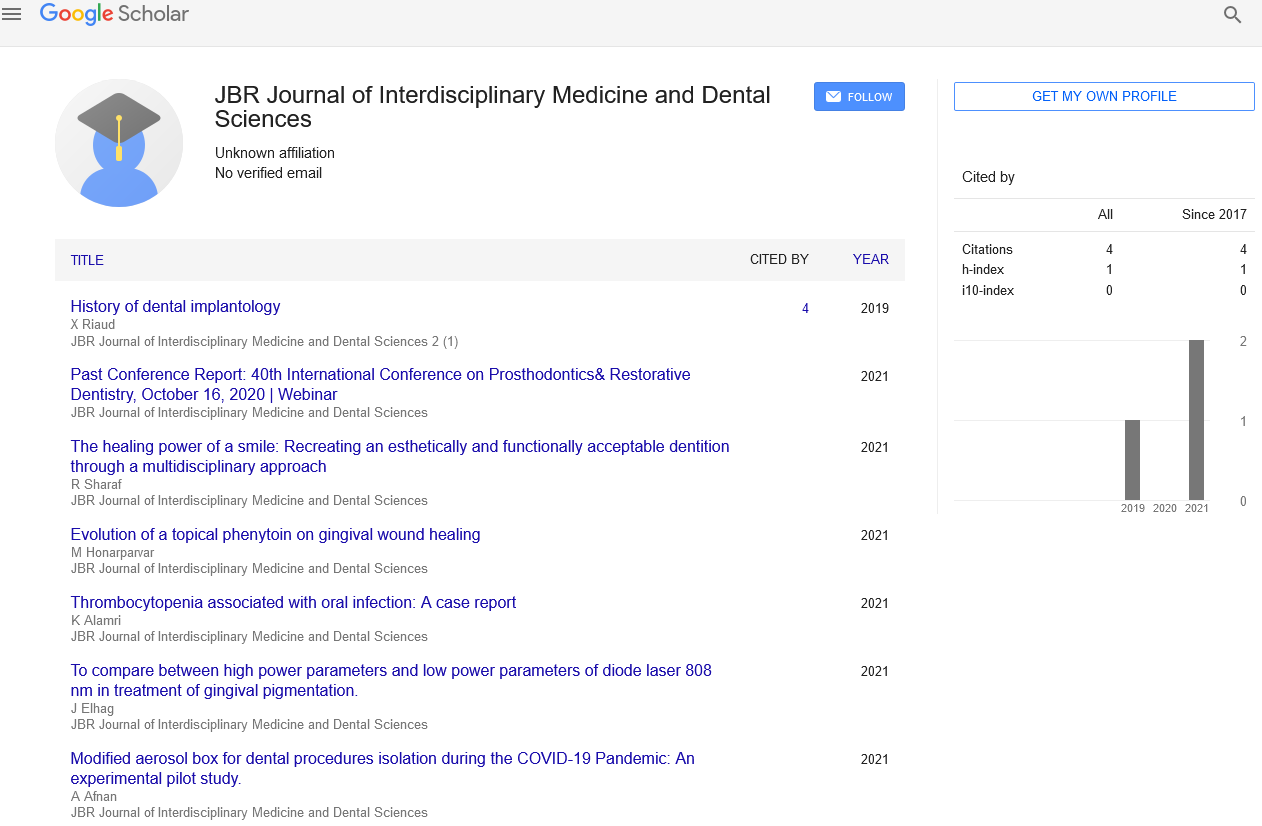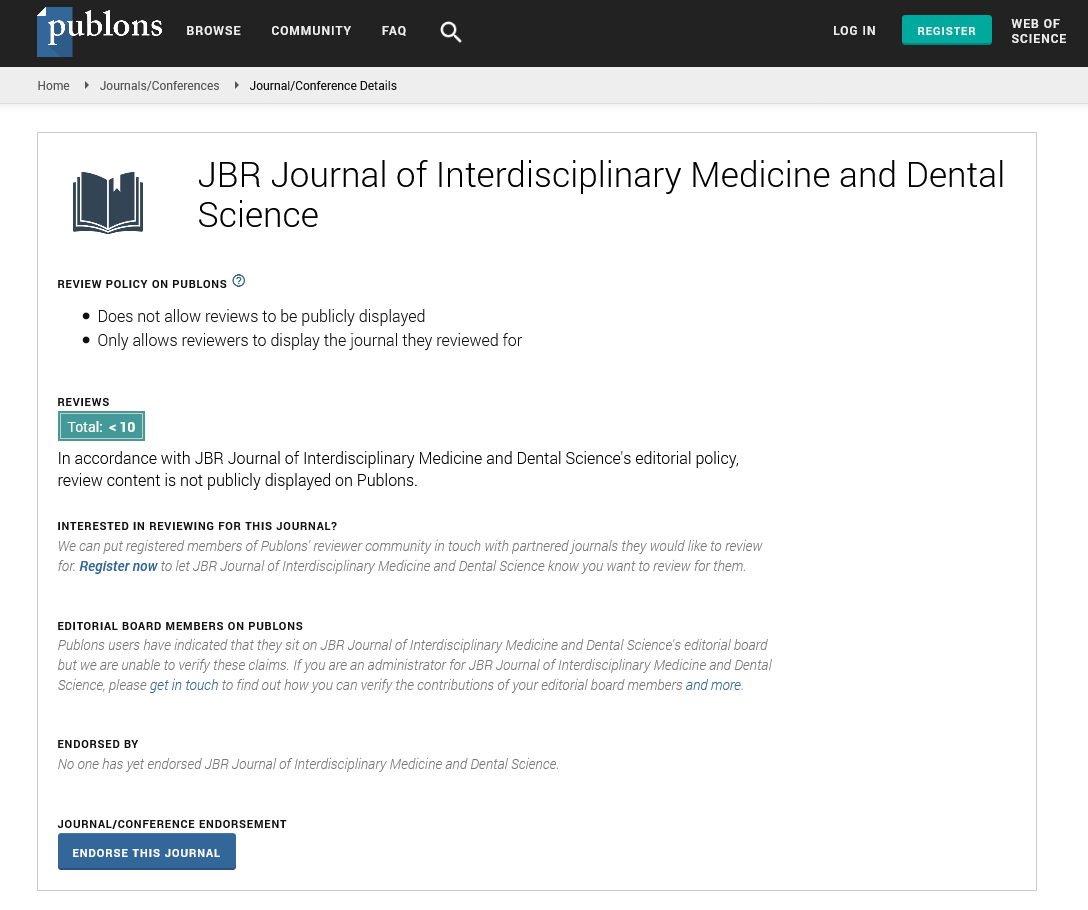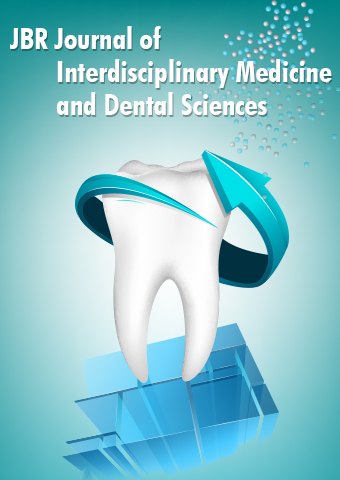Editorial - JBR Journal of Interdisciplinary Medicine and Dental Sciences (2023) Volume 6, Issue 3
The Significance of Medical Ethics in Contemporary Healthcare
Gajean Jain*
Department of Pharmacology in Dentistry, United Kingdom
Department of Pharmacology in Dentistry, United Kingdom
E-mail: jain_ean77@gmail.com
Received: 01-May-2023, Manuscript No. jimds-23-100156; Editor assigned: 04-May-2023, PreQC No. jimds-23-100156 (PQ); Reviewed: 18-May-2023, QC No. jimds-23-100156; Revised: 22-May-2023, Manuscript No. jimds-23-100156 (R); Published: 29-May-2023, DOI: 10.37532/2376- 032X.2023.6(3).62-64
Abstract
Medical ethics is a critical component of contemporary healthcare, guiding healthcare professionals in navigating complex ethical dilemmas and maintaining the highest standards of patient care. This article emphasizes the significance of medical ethics in the modern healthcare landscape, highlighting its impact on patient autonomy, beneficence, non-maleficence, justice, and professional integrity. Respecting patient autonomy promotes shared decision-making and empowers patients to actively participate in their own healthcare. The principles of beneficence and non-maleficence ensure healthcare professionals act in the best interests of their patients while avoiding harm. Justice and equity call for fair allocation of resources and equal access to healthcare services. Upholding professional integrity fosters trust and accountability within the healthcare system. By adhering to medical ethics, healthcare providers can navigate ethical challenges, promote patient-cantered care, and contribute to better patient outcomes.
Keywords
Medical ethics • Contemporary healthcare • Professional integrity •Ethical dilemmas
Introduction
Medical ethics plays a pivotal role in the field of healthcare, providing a moral compass for healthcare professionals and shaping the dynamic relationship between providers and patients. With the advancement of medical technologies and the emergence of complex ethical dilemmas, understanding and applying medical ethics have become increasingly crucial in contemporary healthcare settings [1]. This article aims to explore the significance of medical ethics in the modern healthcare landscape and shed light on its profound impact on patient care and the overall healthcare system. Medical ethics serves as a guiding framework, encompassing a set of principles and values that inform decision-making processes in healthcare. It emphasizes the importance of ethical conduct, respect for patient autonomy, beneficence, non-maleficence, justice, and professional integrity [2]. By adhering to these principles, healthcare professionals strive to uphold the highest standards of patient care while navigating the challenging ethical issues that arise in their practice. Respect for patient autonomy lies at the core of medical ethics. It acknowledges and honors the rights of patients to make informed decisions about their healthcare, promoting their active involvement in the decision-making process. Informed consent, a vital aspect of respecting patient autonomy, ensures that individuals have access to all the relevant information regarding their treatment options, potential risks, and benefits. By valuing patient autonomy, healthcare professionals empower patients to actively participate in their own care and foster a collaborative and trusting relationship [3]. Beneficence and non-maleficence are two essential principles in medical ethics. Beneficence entails promoting the well-being of patients, taking actions that benefit them, and acting in their best interests. Non-maleficence, on the other hand, emphasizes the imperative to avoid causing harm to patients. Balancing these principles can be challenging, particularly in complex medical situations or when faced with limited resources. Healthcare professionals must carefully weigh the potential risks and benefits, making ethically sound decisions that prioritize patient welfare while minimizing harm. Justice and equity are integral components of medical ethics, emphasizing fair and equitable access to healthcare services [4]. Healthcare professionals are tasked with ensuring the just allocation of limited resources, while also advocating for equal access to healthcare for all individuals, irrespective of their socioeconomic status, race, gender, or other characteristics. Addressing health disparities and striving for social justice within the healthcare system are fundamental responsibilities tied to the principles of medical ethics. Moreover, medical ethics places significant importance on maintaining professional integrity. Healthcare professionals are entrusted with sensitive patient information and are expected to uphold confidentiality, respect privacy, and establish clear boundaries in the patient-physician relationship. Adhering to ethical codes and standards set by professional bodies fosters a culture of integrity, accountability, and trust in the healthcare profession.
Materials and Methods
Respect for patient autonomy is a cornerstone of medical ethics. It recognizes patients’ rights to make informed decisions about their own healthcare and promotes shared decision-making between healthcare professionals and patients. This approach empowers individuals to actively participate in their treatment plans, promoting patient satisfaction and engagement in their own care [5]. By respecting patient autonomy, healthcare providers foster trust and strengthen the patient-provider relationship. The principles of beneficence and non-maleficence are essential in guiding healthcare professionals to act in the best interests of their patients. Beneficence emphasizes the duty to promote the well-being of patients, while non-maleficence underscores the obligation to avoid causing harm. Healthcare providers must carefully balance these principles when making treatment decisions, considering the potential risks and benefits to ensure the best possible outcomes for patients.
Promoting patient autonomy
One of the fundamental principles of medical ethics is respect for patient autonomy. This principle recognizes the rights of patients to make informed decisions about their own healthcare. Informed consent is a vital component of respecting patient autonomy, ensuring that patients have the necessary information to make choices about their treatment, including potential risks and benefits [6]. By upholding patient autonomy, healthcare professionals empower individuals to actively participate in their own care and promote shared decisionmaking, which ultimately leads to improved patient satisfaction and outcomes.
Beneficence and non-maleficence
The principles of beneficence and nonmaleficence are essential in guiding healthcare professionals to act in the best interests of their patients while avoiding harm. Beneficence requires healthcare providers to promote the well-being of their patients and prioritize their needs. Non-maleficence, on the other hand, emphasizes the importance of avoiding actions that could cause harm. Balancing these principles can be challenging, especially when faced with complex medical scenarios or scarce resources [7]. However, by carefully evaluating the potential risks and benefits, healthcare professionals can make ethically sound decisions that prioritize patient welfare.
Ensuring justice and equity
Medical ethics also calls for justice and equity in the provision of healthcare. This principle necessitates fair allocation of limited resources, equal access to healthcare services, and the elimination of discrimination. In an increasingly diverse and multicultural society, healthcare professionals must be mindful of biases and strive to provide equitable care to all patients, regardless of their background, socioeconomic status, or other factors. Addressing health disparities and advocating for social justice are integral parts of medical ethics, contributing to a more just and inclusive healthcare system [8].
Maintaining professional integrity
Medical ethics is deeply rooted in maintaining professional integrity and upholding the trust patients place in healthcare providers [9]. This includes maintaining confidentiality, respecting privacy, and preserving the boundaries of the patient-physician relationship. Healthcare professionals must adhere to ethical codes and standards set by their respective professional bodies, fostering a culture of integrity and accountability. By prioritizing professional ethics, healthcare providers not only demonstrate their commitment to patients’ well-being but also contribute to the overall reputation and trustworthiness of the healthcare profession [10].
Discussion
Medical ethics plays a crucial role in shaping the delivery of healthcare and defining the relationship between healthcare professionals and patients. It serves as a moral compass that guides healthcare providers in making difficult decisions, maintaining trust, and upholding the values of compassion, respect, and justice. In an era of advancing medical technologies and complex ethical dilemmas, understanding and applying medical ethics is more important than ever. This article explores the significance of medical ethics in contemporary healthcare and highlights its impact on patient care and the overall healthcare system. Medical ethics plays a vital role in guiding healthcare professionals in making difficult decisions and navigating ethical dilemmas. In the ever-evolving landscape of healthcare, ethical considerations are becoming increasingly complex due to factors such as technological advancements, limited resources, and cultural diversity. Medical ethics provides a framework that helps healthcare providers analyse and address these challenges while ensuring that patient welfare remains paramount.
Conclusion
Medical ethics serves as a guiding framework for healthcare professionals, enabling them to navigate complex ethical dilemmas and ensure the provision of high-quality, patient-centred care. By upholding principles such as respect for patient autonomy, beneficence, non-maleficence, justice, and professional integrity, healthcare providers can foster a culture of ethical practice and build strong relationships with their patients. In an ever-evolving healthcare landscape, medical ethics remains a cornerstone of modern healthcare, promoting ethical decision-making, trust, and ultimately, better patient outcomes. Medical ethics plays an indispensable role in modern healthcare, providing a moral foundation for healthcare professionals and shaping the delivery of patient-cantered care. By embracing the principles of respect for patient autonomy, beneficence, non-maleficence, justice, and professional integrity, healthcare providers can navigate ethical dilemmas, foster trust, and contribute to improved patient outcomes. In an ever-evolving healthcare landscape, medical ethics remains a vital compass that guides healthcare professionals, ensuring ethical decision-making and promoting the highest standards of care.
References
- Pandve HT. Recent advances in oral health care in India? Indian J Dent Res. 20,129–130 (2009).
- Dudala SN, Arlappa N. An updated Prasad's socio economic status classification for 2013. Int J Res Dev Health. 1, 26–28 (2013).
- Sharda A, Sharda S. Factors influencing choice of oral hygiene products used among the population of Udaipur, India. Int J Dent Clinics. 2, 7–12 (2010).
- Bhat PK, Kumar A, Aruna CN. Preventive oral health knowledge, practice and behaviour of patients attending dental institution in Bangalore, India. J Int Oral Health 2, 17–26 (2010).
- Dasgupta U, Mallik S, Naskar S et al. Dental problems and its epidemiological factors- a study on adolescent and adult patients attending dental OPD of a tertiary care hospital in Kolkata, India. J Dent Med Sci. 5, 1–7 (2013).
- Barrieshi-Nusair K, Alomari Q, Said K. Dental health attitudes and behaviour among dental students in Jordan. Community Dent Health. 23,147–151 (2006).
- Vadiakas G, Oulis CJ, Tsinidou K et al. Socio-behavioural factors influencing oral health of 12 and 15 year old Greek adolescents. A national pathfinder survey. Eur Arch Paediatr Dent. 12, 139-145 (2011).
- Kwan SY, Petersen PE, Pine CM et al. Health-promoting schools: an opportunity for oral health promotion. Bull World Health Organ. 83, 677-685 (2005).
- Sharma N, He T, Barker ML et al. Plaque Control Evaluation of a Stabilized Stannous Fluoride Dentifrice Compared to a Triclosan Dentifrice in a Six-Week Trial. J Clin Dent. 24, 31-36 (2013).
- Dwivedi S, Mittal M, Vashisth P et al. Oral Hygiene Pattern observed in Primary School Children as Reported by Their Mother: A Longitudinal Study. World J Dent. 3, 308-312 (2012).
Indexed at, Google Scholar, Crossref


